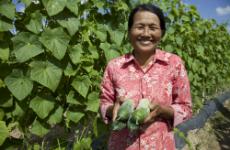Assessing farmer responses to climate change: adjustment policy options
Background
Millions of farmers in East and Southeast Asia must decide how to respond to climate change. They risk poverty by not responding but if they decide to act then their choices may be distorted by market failures and lack of information. Many climate related studies have identified the likelihood of significant effects on productivity, outputs and therefore prices of agricultural products as a result of climate change.

Project objectives
The aim of this work was to design policy to mitigate the cost of adjustment by farmers to climate change and thereby to improve their livelihood. The project focused on the rice sector. The objectives were to:
- identify those farmers at risk from climate change
- develop the capacity to model the consequences of climate change through market processes for prices and outputs and therefore incomes of climate change and farmer responses to climate change and to use that modelling capability alongside an assessment framework. This project follows on from earlier work assessing farmer responses to climate change adjustment policy options in China and Vietnam and a top down assessment of issues associated with climate change and regional agricultural commodity flows.
Project outputs
The key output of this project was the development of and support for the analysis and adoption of policy options in response to climate change in order to raise farmer welfare. Key to achieving this was engaging with those responsible for the policy response to climate change.
Some key results and their policy implications are detailed here.
Project partners
Collaborating institutions:
- Center for Chinese Agricultural Policy, China
- Institute of Policy and Strategy for Agriculture and Rural Development, Vietnam
- School of Advanced Agricultural Sciences, Peking University, China
Funding:
Australian Centre for International Agricultural Research (ACIAR Project ADP/2011/039), 2014-2016
